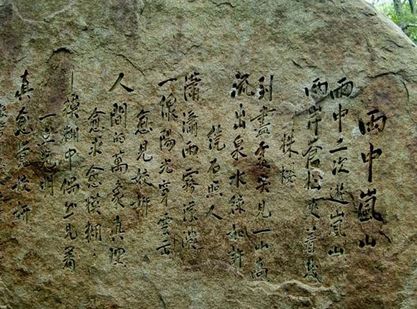Translation: Arashiyama in the Rain
On a recent trip to Kyoto in Japan, I came across a monument with a Chinese poem on it attributed to Zhou Enlai up on Arashiyama Mountain (岚山). Here’s what it looked like:
The inscription was a bit difficult for me to read, so I took a photo and then got a Chinese friend to help me decipher it. It turns out to be a poem that Zhou penned while studying abroad in Japan in 1919. In the 1970s, when Zhou came to Japan looking to establish a trade relationship, this monument was presented to him. More about the poem here on Baidu Baike. Here’s the poem rendered more legibly:
《雨ä¸å²šå±±ã€‹
雨ä¸äºŒæ¬¡æ¸¸å²šå±±
两岸è‹æ¾
夹ç€å‡ æ ªæ¨±
到尽处
çªè§ä¸€å±±é«˜
æµå‡ºæ³‰æ°´ç»¿å¦‚许
绕石照人
潇潇雨 雾蒙浓
一线阳光穿云出
愈è§å¨‡å¦
人间的万象真ç†
愈求愈模糊
模糊ä¸å¶ç„¶è§ç€ä¸€ç‚¹å…‰æ˜Ž
真愈觉娇å¦
Arashiyama in the Rain
I went to Arashiyama twice in the rain
Both banks were framed by green pines
Squeezing against a few cherry trees
Towards the horizon
One mountain peak stood out the most
Light green spring waters flowed out like this
Winding around the rocks, holding my reflection
Whistling winds, dense mist and fog
A ray of light peaked through the clouds
The more I looked upon this beauty –
The realities of the human world
The more I want, the more confused I become –
In the confusion I suddenly chanced upon this point of light
The more I truly sensed its beauty
—
The last five lines of the poem are the most interesting to me. I guess when Zhou Enlai wrote the thing as a young man he was reflecting a more conventional idea of nature providing grounding for human thought, aesthetics, etc. But 50 years later, when courting the Japanese over the possibility of developing China, the image of a ray of light coming though the clouds takes on an entirely different character. I wonder if the master statesman was pleased with the selection.
